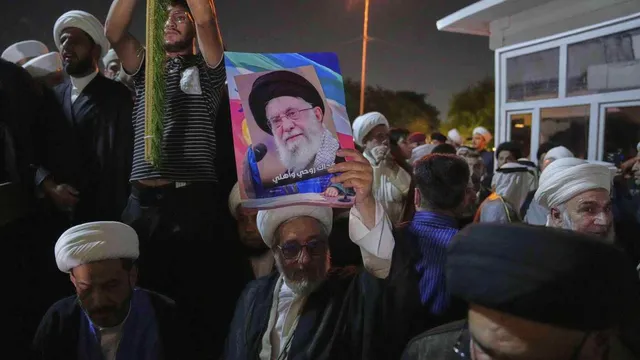
Iran resists nuclear negotiations amid ongoing military conflict
2025-06-20 07:55- Foreign ministers of the UK, France, and Germany are meeting with Iran's foreign minister in Geneva to discuss the ongoing military conflict.
- Israel's airstrikes on Iranian sites have escalated hostilities, prompting concerns over nuclear negotiations.
- Iran's resistance to engage in dialogues amid military aggression highlights the precarious balance between diplomacy and conflict.
Express your sentiment!
Insights
In Geneva, Switzerland, on a recent Friday, a significant diplomatic meeting took place involving foreign ministers from the United Kingdom, France, and Germany, alongside Iran's Foreign Minister Abbas Araghchi. This was the first direct engagement between Iranian and Western leaders since the escalation of military hostilities, particularly concerning Israel's focused airstrikes on Iranian nuclear and military targets. The conflict had intensified just a week prior, marked by violent exchanges including Iranian missile strikes on Israeli cities, leading to numerous casualties on both sides. As the situation escalated, the urgency for diplomatic discourse surged. British Foreign Secretary David Lammy articulated a 'perilous' situation, reflecting on his discussions with U.S. officials concerning potential military actions against Iran. Lammy emphasized the necessity for diplomatic solutions immediately, suggesting that a window for renewed talks might exist in the coming weeks. This urgency stems from prior negotiations regarding Iran's nuclear program, which had raised international concerns due to the enrichment levels Iran was achieving. Despite the pressure from Western nations urging Iran to recommence negotiations, Araghchi condemned these calls, insisting that negotiations should not occur while attacks from Israel persisted. He accused the U.S. of complicity in these military actions and affirmed Iran's stance on maintaining their right to defend against aggression. The steadfastness of Iran's position reflects the sensitive intertwining of military aggression and diplomatic discourse in the region. The ongoing military confrontations have led to significant casualties, with reports indicating at least 24 deaths from Israeli strikes and Iranian missile attacks resulting in injuries on both sides. The potential for broader conflict remains high as both nations continue to exchange military fire, complicating diplomatic efforts and prompting calls from European leaders for collective and serious negotiations to prevent further escalation. The broader implications of these dynamics continue to shape the geopolitical landscape of the Middle East amidst rising tensions and an urgent appeal for peaceful resolution.
Contexts
The history of Iran's nuclear negotiations is a complex saga that has unfolded over several decades, shaped by geopolitical factors, international relations, and varying domestic policies within Iran. The roots of these negotiations trace back to Iran’s nuclear program, which began in the early 1950s during the Shah's reign, when the United States provided support for nuclear development. However, following the 1979 Iranian Revolution, Iran's nuclear ambitions became a contentious issue as the new regime distanced itself from the West, particularly the U.S., and concerns about potential nuclear proliferation grew within the international community. In the early 2000s, Iran's nuclear program came under intensified scrutiny after revelations about undeclared nuclear facilities. The International Atomic Energy Agency (IAEA) began an investigation, leading to increased tensions between Iran and Western countries, particularly the United States and European nations. The situation escalated in 2006 when Iran resumed uranium enrichment activities, prompting the UN Security Council to impose sanctions. Negotiations attempted to address the situation, with diplomatic efforts led by the E3 (France, Germany, and the UK) and later involving the U.S. under the Obama administration, resulting in the historic Joint Comprehensive Plan of Action (JCPOA) in 2015. The JCPOA marked a significant breakthrough, as it placed limits on Iran’s nuclear program in exchange for sanctions relief. The agreement was hailed as a diplomatic success, but it faced opposition from various quarters, including hardliners in Iran and the incoming Trump administration in the United States. In May 2018, President Trump unilaterally withdrew the U.S. from the JCPOA, reimposing strict sanctions, which led Iran to gradually step back from its commitments under the agreement. This decision substantially increased regional tensions and prompted fears of a potential military confrontation. In the following years, the negotiations saw fluctuating dynamics, with the Biden administration expressing a willingness to re-enter talks. By 2021, indirect negotiations between the U.S. and Iran commenced in Vienna, focused on restoring compliance with the JCPOA and addressing concerns regarding Iran’s missile program and its regional activities. However, various rounds of talks encountered obstacles, with issues such as sanctions relief and Iran's nuclear advancements remaining contentious. As of now, the future of Iran's nuclear negotiations remains uncertain, hinging on the balance between diplomatic efforts and pressures from multiple stakeholders involved in the region.